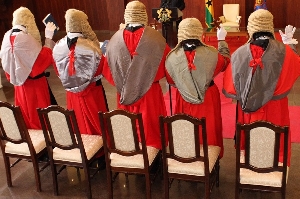: Democracy or Kleptocracy?
Africa's long suffering people are all too frequently caught in the crossfire of rampaging wars, millions afflicted with diseases, preyed upon by greedy despots and prevented by corrupt leaders and bureaucracies in a kleptocracy from obtaining basic schooling, medical attention, and any semblance of economic opportunities.
A look at the socio-political and economic environment in Ghana today reveals a horrifying picture. There is massive corruption, staggering poverty, unemployment, poor education, no water to drink and no electricity, deteriorating infrastructure, and general degree of hopelessness. According to the World Bank Human Development Index, almost half of the national population live below the poverty line surviving on less than a dollar per day. And as many as over 75% live on less than $2.00 a day. The economic conditions felt by the ordinary Ghanaian are poorer than ever.
However, Ghanaians are resilient. They have learned to survive. They look after one another, too, and altruism flourishes amid surprising circumstances of adversity. What does political independence mean to ordinary Ghanaians? Independence was supposed to make life better but what do we see around us? More than half a century of independence has brought nothing in terms of real development in the country. In many parts of the country, hundreds of kilometers of colonial roads have disappeared, schools and clinics are in dilapidated state and social infrastructure have been allowed to collapse. In 56 years not even a single kilometer of railway line has been constructed and the one the colonial rulers left behind have been allowed to deteriorate and collapse. Something is definitely wrong and needs to be put right now.
The country is in deep crisis and the biggest problems at hand now are corruption, poverty, and unemployment. Several decades ago, may be you could live with an economic growth rate of 3.5% per annum, meanwhile the labour force in the country is growing at 5% per annum and creating unprecedented labour tensions and the result is a huge unemployment problem among the youth. More than half of the jobless rate in Ghana today is accounted for by people in their 20's and 30's. This is very alarming. Figures are hard to get by but it is abundantly clear that about six out of ten University graduates this year are without jobs not to count Secondary school and Technical School graduates.
There is no system in place to absorb new graduates into the workforce as new graduates are left on their own to fend for themselves. I was moved to tears the other day as I listened to a forty something year old university graduate giving a testimony at church for landing his first job. He was so happy and thankful to God for giving him his first job. Obviously I was happy for him too because he counts himself so lucky to have a job while many of his colleagues were still searching. But at 40? In many places, at 40 you are already a senior manager not starting your first job and there is no cause for celebration. Just how far a young Ghanaian graduate would go to get a job? The answer is from anywhere to everywhere. That explains the sad story of some Ghanaian stoways. They assumed rightly or wrongly they can find jobs abroad if they can't get one at home. And do you blame them? The need to create new opportunities is more crucial than ever. The dilemma facing us now is not only that more than 200,000 people join the job market every year, but that many of them are well educated and naturally have higher expectations.
Lack of job after the first degree force some people back to school hoping that if they get a Masters degree things would be better but they come out to meet even a tougher job market. How can we take care of our youth as a nation if we don't care whether they are getting the right experience at the right time? The fear of the unknown has kept many Ghanaian graduates from foreign universities staying abroad. They are scared they may not get a job if they come home. The jobless rate rose as better Ghana failed to create jobs for new graduates entering the job market but helped those in government to develop "pot bellies". Since there is almost an absence of a viable private sector in Ghana, the onus of creating jobs fall squarely on the shoulders of the government, and government needs to create about 400,000 jobs annually if the unemployment rate is to reduce. The government must take the lead in economic development and not leave it to a non existent private sector. It is the duty and the responsibility of the government to lead the way and also create the right atmosphere to attract foreign direct investment in our economy.
I have written on this one before. The issue of corruption in government needs to be tackled head on. Just paying lip service to the slogan of "zero tolerance" fools no one. Many Ghanaians are of the believe that the perception of corruption in government, and corruption that comes to the open are just a tip of the iceberg. These are big problems that are depriving communities of the good drinking water and the electricity they need. It is preventing investment in vital health service delivery and it prevents school children from getting access to good quality education.
What happened to those the Parliamentary Accounts Committee indicted in its public sittings? Why is the Woyome trial not moving forward? What progress has been made by the sole commissioner appointed to investigate the numerous judgement debts? Why is the government not tacking the corruption in the National youth Employment program and the national Health Insurance Scheme? All this money is going waste while Ghanaian kids continue to die from treatable malaria and other sicknesses and continue to study under trees. What does this tell about the government that is supervising this rot and the party in power? Unless we tackle governance and accountability we are not addressing the real issues, we are not tackling the bread and butter issues. To tackle corruption adequately, I recommend the setting up of a government accountability project, a private watch dog group to ensure accountability on the part of the government. The Economic and Organized Crime Unit and CHRAJ, however well intentioned they may be, have been rendered powerless and useless entities and can’t discharge their duties adequately. That is why a private watch dog group is preferred. The current maintenance of law and order and prevention of corruption is systematically flawed. There is also a need to install Inspector Generals in every ministry reporting to a Public Integrity Commissioner (PIC) ( a post created by Parliament) who will have the power to refer corrupt officials for prosecution. The installation of Inspector Generals, and the creation of a Public Integrity Commissioner are important steps to fight corruption and cronyism which in turn will help strengthen democratic institutions in the discharge of its duties and make them more effective..
But before that we need to strenghten Parliament to make it perform its duty of checking executive power and also controlling the national purse more effectively. Our constitution is so flawed. It has concentrated all powers in the hands of the executive branch of government seriously constraining the work of Parliament. Our President under the 1992 constitution is just too powerful. He has the power to hire and fire everyone in Ghana, and also to order or not to order a probe into everything. If he doesn't do it nobody can do it. Parliament must and can have the power to probe executive acts. And the judiciary must not only be seen to be independent but must act explicitly so in a transparent and fearless way that gives meaning to Judicial independence. .
I give the current President credit for trying to put together the leanest government ever in the fourth republic. But again, there are too many ministers without portfolio at the presidency, so government needs to downsize. The current size of the government is too big and costly, in fact over bloated. Japan runs the World's third largest economy with just 17 ministers. How come a country like Ghana has that many ministers and deputy ministers. What for? We need fiscal discipline. The people are overburdened with taxes while government displays a great deal of fiscal indiscipline.
The government needs to create the right business atmosphere for industries and businesses to thrive so that they can compliment government efforts at creating jobs. Elsewhere taxes are cut to spur growth, but in Ghana, an economic team that lacks fresh ideas always look up to increased taxation as a way of generating revenue. Even the Electricity Corporation of Ghana and the Ghana Water company, the two most dysfunctional institutions in Ghana today are talking about tariff increases. Government needs to simplify taxes, lower tariffs on imports, and clear away red tape to encourage entrepreneurial skills. Too much taxes stifle growth. You don't need to be a prize winning Nobel economist to know this.
The priority should be to do everything possible to wage a battle against poverty, raise living standards, and encourage businesses to thrive. Some 8 million Ghanaians live on less than one dollar a day, this is unacceptable and a shame. Ghana's poor are less inclined to vote than the middle class because they have kind of resigned themselves to fate, that no politician nor political party can make a difference in their lives, thus virtually guaranteeing that their discontent would not prevail on the election day. Elections 2000 and 2008 were the turning points and just as there was a yearning for change in 2000 and 2008 that drove the people to the polls, I can sense the same yearning for a change now and that will drive people to the streets if government do not sit up and address with all seriousness the problems confronting this nation. Those who have ears let them listen.
Ben Ofosu-Appiah. Tokyo, Japan.
The author is a senior social and political analyst and policy strategist who lives, writes, and plays in Tokyo, Japan. Your views and comments are welcomed; do4luv27@yahoo.com
Opinions of Thursday, 14 March 2013
Columnist: Ofosu-Appiah, Ben














